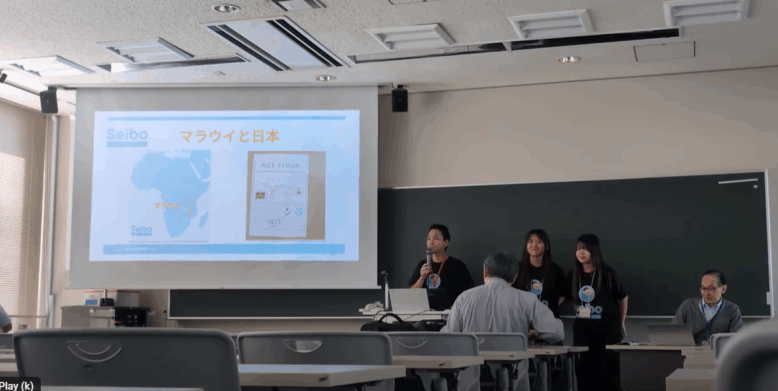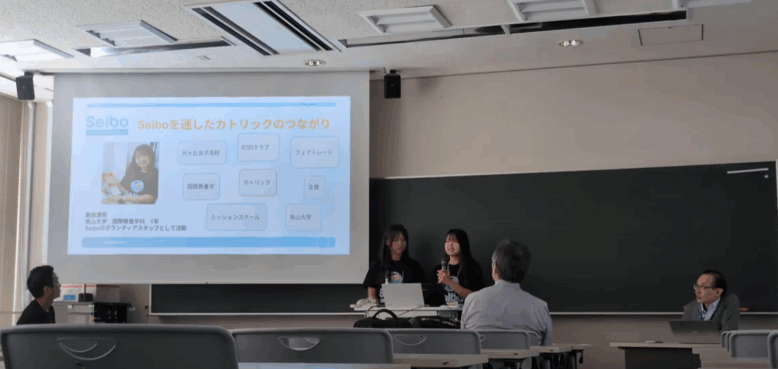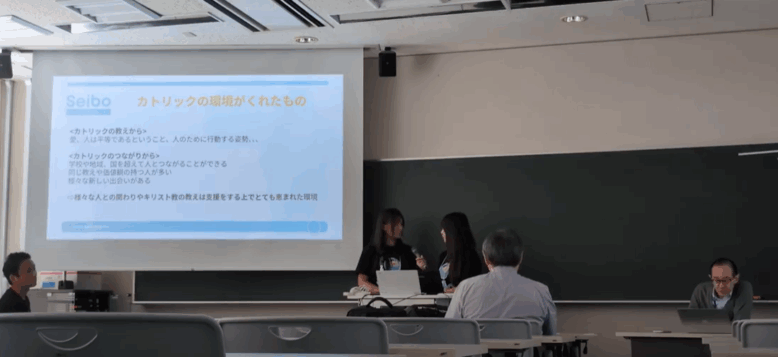
On August 30, 2025, Seibo presented research at the Catholic Educational Association.
The values nurtured in Catholic schools—such as caring for one’s neighbor and the desire to contribute to society—often show their greatest power outside the classroom. In this presentation, Seibo highlighted how its activities as an NPO illustrate the significance of learning that arises when education and social action are connected. In particular, collaboration with university-level career education has become a valuable opportunity that supports the growth of students.
1. When Education and NPOs Connect
Catholic education emphasizes compassion, social justice, and service. However, classrooms alone provide only limited opportunities to engage with real economic and social issues. Here, organizations like Seibo play an important role. Through school meal programs and fair trade, Seibo creates opportunities for students to practice the values they learn in school in real society.
2. Learning Social Systems Through Economics
The economic perspective is indispensable in NPO activities. For example, Seibo’s sale of Malawian coffee is more than just a commercial product—it introduces students to life in developing countries and the mechanisms of fair trade. Students learn that NPOs differ from volunteer groups: they generate profit, but reinvest it primarily for social purposes. This directly reflects the Catholic teaching on the “preferential option for the poor” as expressed by Pope Francis.
3. Initiatives at High Schools

Seison Jogakuin Junior & Senior High School
Students experienced approaching social issues by promoting and selling Malawian coffee and tea. They also deepened their learning by interacting with senior students at sister school Nanzan University, thus bridging values from high school to university.
Hikarigaoka High School
Students engaged in interviews with Malawian staff, participated in NPO board meetings, and worked as staff during the Osaka Expo. These real-life experiences connecting Japan and abroad greatly broadened their horizons.
4. Initiatives at Universities
At the university level, these experiences expand into career education. More students are beginning to envision their career paths through internships and volunteer work. At institutions such as Nanzan University and Rikkyo University, many students participate in Seibo’s activities through their volunteer centers. Some even take on paid staff roles, with the aim of pursuing careers in NPOs or social contribution fields.
5. Expanding Possibilities Through Collaboration
Seibo’s initiatives are not limited to Catholic schools. Partnerships with universities like Rikkyo, which value the Christian spirit, demonstrate how interdenominational collaboration can generate broader social impact. The shared value of “respecting human dignity” enables diverse forms of cooperation.
Conclusion
Collaboration between Catholic education and NPOs provides students with a real sense of connection to society. It encourages them to reflect on how their learning and personal growth can contribute to the world. Seibo’s activities show how values nurtured in education can find meaningful expression within economic and social action. These efforts serve as an important guidepost for the future of career education.



